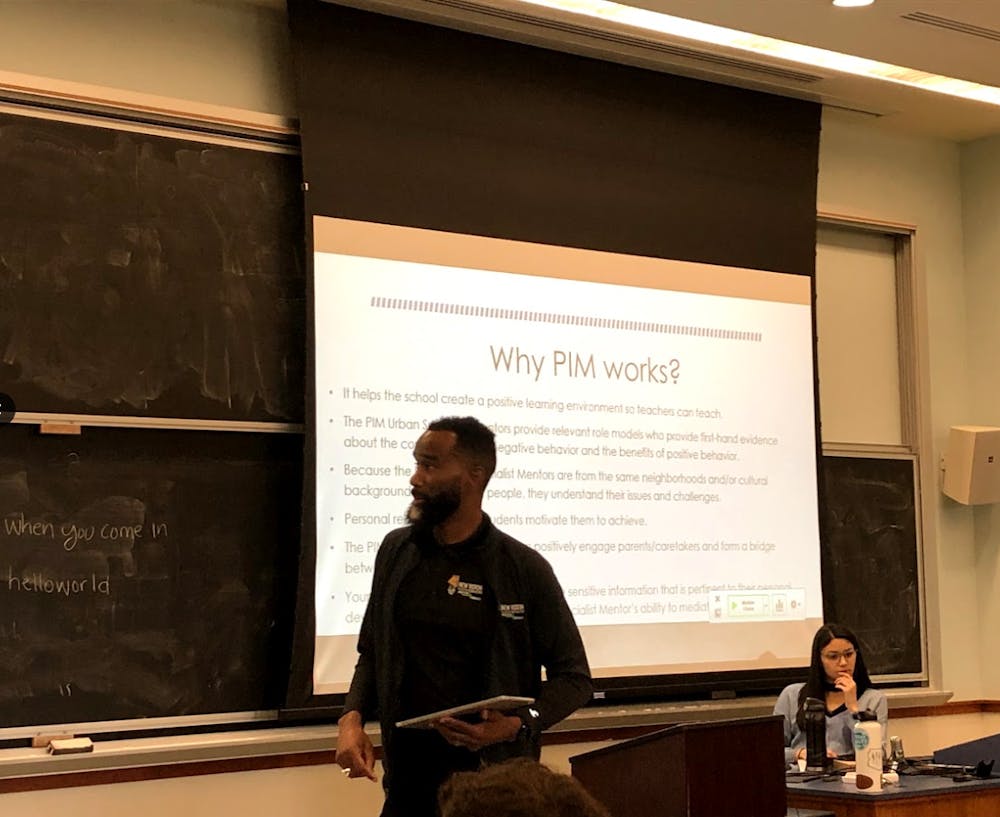Bishop Billy H. Stanfield Jr., the founder and executive director of New Vision Youth Services, gave a guest lecture at Professor Philip Leaf’s community-based learning course, “Health and Wellbeing in Baltimore: A Public Health Perspective” on Tuesday.
New Vision Youth Services was formed in 2005 and aims to decrease drug use, violence and truancy on school campuses. Employees of this program establish relationships with students, particularly those with behavioral issues or problems at home.
Stanfield explained that the people working for the program grew up in similar environments to these students and have experience with difficult upbringings. He stated that this helps them relate to students, which is necessary in understanding why they act out.
Stanfield also cited his background as a reason he created this program. Before becoming a pastor at The Impact Church, he was a drug dealer. After being shot in both of his legs and spending five years in federal prison, Stanfield had a religious awakening. He added that Leaf had helped him change his path, and this relationship helped him later start his New Vision Youth Services program.
Freshman Ayla Frost, a student in Leaf’s course, commented on how inspirational it was to see this deep relationship between her professor and Stanfield.
“It was really cool to hear about my professor, who I only know as a teaching figure. I didn’t realize how valuable the work he was doing with connecting theoretical academic Hopkins efforts to improve the well-being of Baltimore with grassroots organizations and activists,” she said.
In his lecture, Stanfield told a story about a student who had behavioral issues that he and his employees had been recruited to help. The employees, Stanfield, the student’s teachers and counselors all sat in on a meeting with the student and his mother, who would shush the student and tell him not to overreact or be emotional. During the meeting, the student began yelling that it was his mother who made him sell drugs to make money so she could get high.
This is one of many stories Stanfield used to explain why his employees must have relatable backgrounds so they can form personal connections with the students rather than trying to be counselors or “hall monitors” to the students.
“Teachers say [we’re] just trying to be their friends, [we’re] not trying to hold them accountable,” he said. “That’s not true. Evidence says that if we build relationships, positive relationships, evidence says that if we are passionately concerned about them, evidence says that if we are consistent, their walls will come down.”
Stanfield emphasized the importance of close familial relationships as a child grows up and develops behaviors and attitudes towards the world — specifically pointing to how his program’s employees can fill this role if a student lacks healthy familial relationships.
The New Vision Youth Services program is implemented in a wide variety of neighborhoods. Stanfield explained that this is significant because it discredits the negative stigma that “bad neighborhoods make bad students.” On the contrary, Stanfield said that his program is present at one of the top schools in the country, and the school has asked for them to stay a second year.
After the talk, sophomore Micki Paugh stated that her favorite part of the lecture was hearing Stanfield’s stories about how employees were sympathetic and knowledgeable about domestic issues.
“Many of the violent acts perpetuated by the kids in school are often misdirections of their own personal issues,“ she said. “These kids are dealing with constant trauma and they need understanding and compassion in school.”
However, Paugh wished that Stanfield had talked more about the ways that New Vision Youth Services screens and recruits employees for their program.
“It would have been interesting to learn more about the recruitment of the mentors in his program. He was a little vague and I was curious to see how his organization was able to find many more dedicated mentors with such an expansion within the city,” she said.
Freshman Grace McGonagle said that she found it inspiring to hear from someone dedicated to improving Baltimore.
“I loved the talk today. It’s great to hear from someone so passionate and dedicated to guiding and protecting high schoolers by working to truly build a relationship with each one,” she said.
Freshman Casey Levitt was interested in learning about issues in Baltimore schools and their students.
“At Hopkins it can be easy to forget about the issues affecting people in Baltimore,“ she said. “We’re pretty isolated here.”





